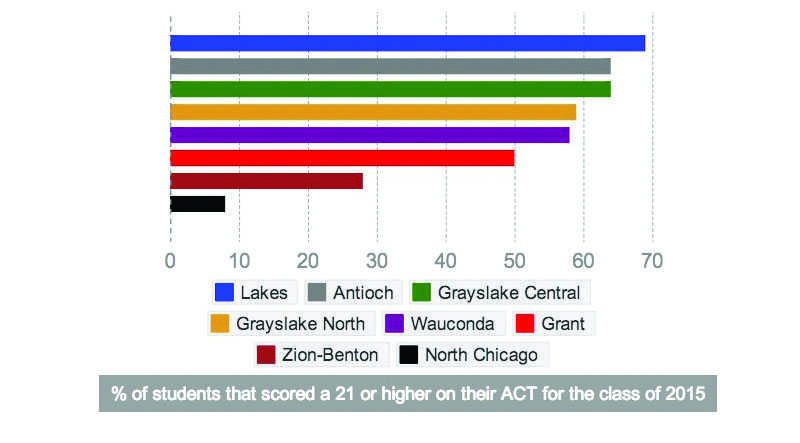Testing Time
Changes are being brought upon ACHS as students and staff seek a change to curriculum and standardized testing.
PAST
Students learn. Teachers teach. Administrators administrate. But what exactly does that mean?
Curriculum is what tells teachers what to teach and how to teach it. Over the years, Antioch Community High School, along with Illinois schools alike, saw changes to their curriculum. It went from federal to state requirements. It is nearing a nationwide level again as Common Core is spreading across America attempting to improve the education of young, hopefuls.
In the past, curriculum never played as big of a role as it does today. Due to the low numbers of college-bound students in high school, not many of those students cared or thought of a way to promote a standard that appropriately portrays how a good student should be.
ACHS social studies teacher Charlie Trout said, “I’m not really sure how many students were college bound but it was probably between 50 to 60 percent. It is usually clear to see who is college bound, but not always.”
ACHS students of the past viewed standardized testing differently as well. Only students who knew they were set on attending college took standardized tests such as the ACT and SAT to measure their college readiness.
“Since I plan on going to trade school, I don’t see the need for everyone taking the ACT,” said junior Tristin Eves.
As time progressed, so did the number of ACHS students willing to further their education after high school. Curriculum began to evolve as well.
In 2002, former President George Bush passed the No Child Left Behind Act in hopes of setting the benchmark nationwide for children attending school. It included the first push for standardized testing to assess where students really were on the IQ scale.
The effects of the No Child Left Behind Act are fading away as new benchmarks are being followed nationally. ACHS is not exception as it is adopting Common Core standards.
“The biggest change in curriculum the last few years has been the shift to the Common Core Standards. These standards focus on students’ skills as opposed to strictly content. Students skills that the CC focuses on, but are not limited to, include critical thinking skills and problem-solving skills. There are specific English Language Arts (ELA) and math standards. The Next Generation Science Standards (NGSS) are to be implemented next,” Assistant Principal of Curriculum and Instruction Aryan Haren said.
PRESENT
To go along with curriculum, standardized testing plays a big role for students in high school. At ACHS, the most emphasized standardized test has been the ACT. According to the ACT, being college ready is receiving a 21 or higher. At ACHS, more than half of the class of 2015 reached that benchmark.
Another opportunity introduced to the Sequoit student body this school year is the new Cum Laude program. This program challenges students to earn 26 credits, to have zero suspensions, to volunteer for at least 40 hours, to have a 95 percent attendance rate, pass three capstone classes and to be involved in at least four extracurricular activities.
“I believe this program challenges our students to take more rigorous classes and get more involved inside and outside of school. Overall, the program raises the bar for expectations for our students to be well-rounded, successful young adults. This program promotes our core beliefs of respect, responsibility and pride,” Haren said.
Sophomore Mara Solano is up to the challenge.
“I think the Cum Laude program is a great addition to our school,” Solano said. “It is going to help a lot of students in the near future.”
FUTURE
With recent changes to curriculum and standardized testing, it is hard to predict where they will take Antioch Community High School in the future. However, students recently learned about a new test they will take come spring 2015. It is the Partnership for Assessment of Readiness for College and Careers test (PARCC).
It was rumored that the PARCC test will eventually replace the ACT as the Illinois state funded standardized test. This brings up many concerns. As many students depend on the state funded ACT in the spring to send to colleges; they might not be given another chance to test for education after high school.
“I do not think the ACT is going away. Currently, the ACT is used for entrance into colleges and universities across the nation. Whether the ACT will be taken during the school day and funded by the state, in the future, is a different question. For this year, juniors will be taking the ACT on March 3rd. Future ACT testing has not been determined,” Haren said. “ If PARCC continues to be the state-mandated test, it will be several years before we know what the scores mean and how to establish college entrance criteria for post-secondary school experiences.”
Solano feels otherwise in regards of the ACT disappearing.
“I feel like the ACT going away would be a good thing because a test score shouldn’t define how smart you are or what college is right for you. It doesn’t prove how much work and creativity you put into your work,” Solano said. “I wish we had less homework and more projects because it shows how well your work ethic is and how creative you can be.”
When it comes to standardized testing and curriculum, much like anything else, as time goes by many aspects change. As people evolve, so does the way that they are taught. However, the importance of both could not be stressed enough for the good of students’ futures all over the country.


